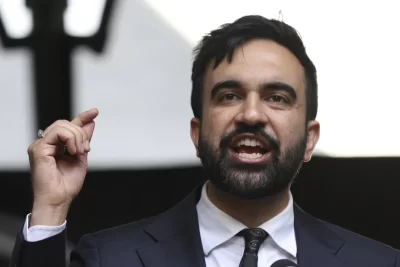
CHARLOTTE, N.C. — Vice President Kamala Harris and former President Donald Trump launched campaign blitzes Thursday with dramatically different approaches to attracting swing-state voters who will decide the presidential contest.
In North Carolina, Democratic nominee Harris used rallies in Charlotte and Greensboro to tout endorsements from Republicans who have crossed the aisle to back her. She also promised to protect access to health care and abortion, while delighting her partisan crowds with celebrations of her debate performance Tuesday, taking digs at Trump and cheerleading for her campaign and the country.
“We’re having a good time, aren’t we?” Harris declared, smiling as her boisterous crowd chanted: “USA! USA! USA!”
In the border state of Arizona, the Republican Trump pitched a tax exemption on all overtime wages, adding it to his previous proposals to not tax tip s or Social Security income. But the former president squeezed those proposals, along with a nonspecific pledge to lower housing costs, into a stemwinding speech marked by his most incendiary rhetoric on immigration and immigrants themselves, name-calling of Harris and others, and a dark, exaggerated portrait of a nation Trump insisted is in a freefall only he can reverse.
“I was angry at the debate,” Trump said, mocking commentators’ description of his performance Tuesday. “And, yes, I am angry,” he said, because “everything is terrible” since Harris and President Joe Biden are “destroying our country.” As he repeated the word “angry,” Trump’s crowd in Tucson answered with its own “USA! USA! USA!” chants.
The competing visions and narratives underscored the starkly different choices faced by voters in the battleground states that will decide the outcome. Harris is casting a wide net, depending on Democrats’ diverse coalition and hoping to add moderate and even conservative Republicans repelled by the former president. Trump, while seeking a broad working-class coalition with his tax ideas, is digging in on arguments about the country — and his political opponents — that are aimed most squarely at his most strident supporters.
That could become a consistent frame for the closing stretch of the campaign after Trump shut the door on another debate. That potentially could have been another seminal moment during a year that already has boomeranged around milestones like Trump’s criminal conviction by a New York jury, Trump surviving an assassination attempt, Biden ending his reelection bid amid questions about his age, and Harris consolidating Democratic support to become the first woman of color to lead a major-party ticket.
“There will be no third debate,” Trump said Thursday, counting his June matchup against Biden in the total, and insisting he had won his lone encounter with Harris on Tuesday in Philadelphia.
The post-debate blitz reflected the narrow path to 270 Electoral College votes for both candidates, with the campaign already having become concentrated on seven swing states: Arizona, Georgia, Michigan, North Carolina, Nevada, Pennsylvania and Wisconsin.
Harris’ itinerary Thursday put her in a state Trump won twice, but his margin of 1.3 percentage points in 2020 was his closest statewide victory. Arizona, meanwhile, was one of Trump’s narrowest losses four years ago. He won the state in 2016.
In North Carolina, Harris took her own post-debate victory lap, and her campaign already has cut key moments of the debate into ads. But Harris warned against overconfidence, calling herself an underdog and making plain the stakes.
“This is not 2016 or 2020,” she said in Charlotte. “Just imagine Donald Trump with no guardrails.”
She touted endorsements from Republican former Vice President Dick Cheney and his daughter, former Rep. Liz Cheney, both of whom have deemed Trump a fundamental threat to American values and democracy.
“Democrats, Republicans and independents are supporting our campaign,” Harris said in Charlotte, praising the Cheneys and like-minded Republicans as citizens who recognize a need to “put country above party and defend our Constitution.”
Yet she also made a full-throated defense of the Affordable Care Act, the 2010 law commonly called “Obamacare” and passed over near-unanimous Republican opposition. She mocked Trump, who has spent years promising to scrap the ACA but said at their debate that he still has no specific replacement in mind.
“He said, ‘concepts of a plan,’” Harris said. “Concepts. Concepts. No actual plan. Concepts. … Forty-five million Americans are insured through the Affordable Care Act. And he’s going to end it based on a concept.”
She saddled Trump again with the Supreme Court’s decision to end a woman’s federal right to abortion, paving the way for Republican-led states to severely restrict and in some cases effectively ban the procedure.




